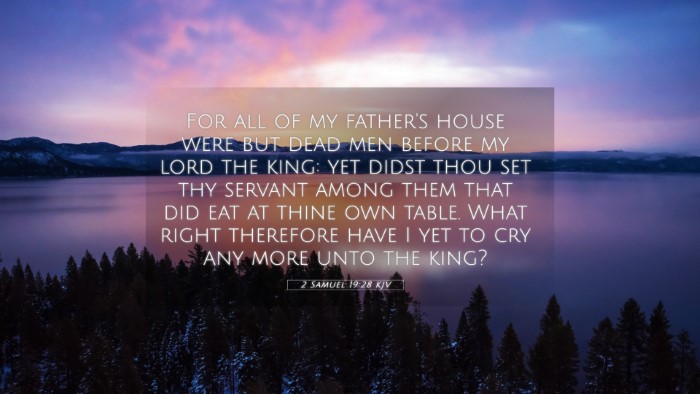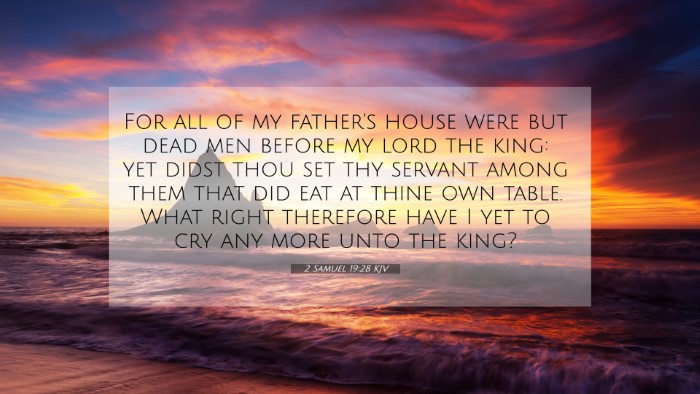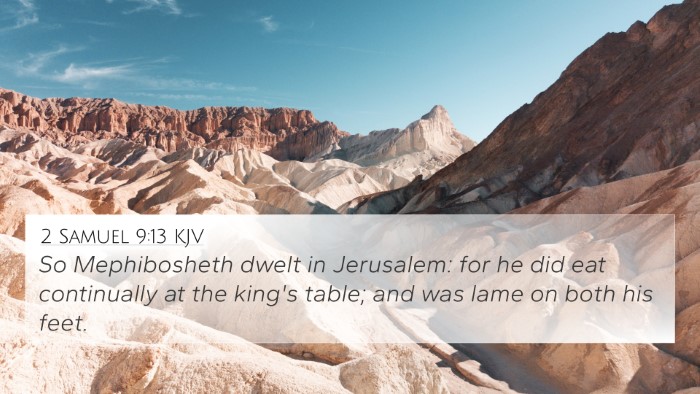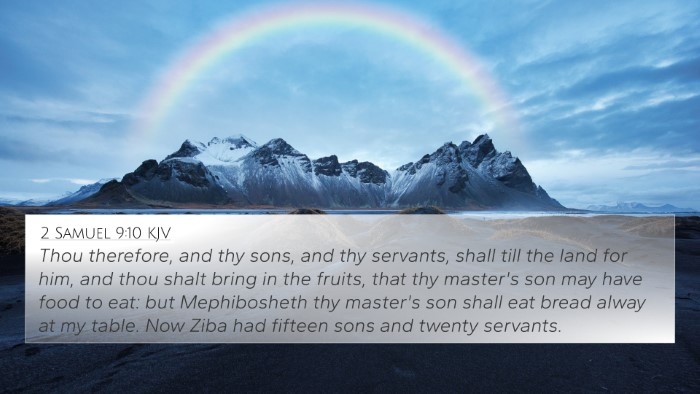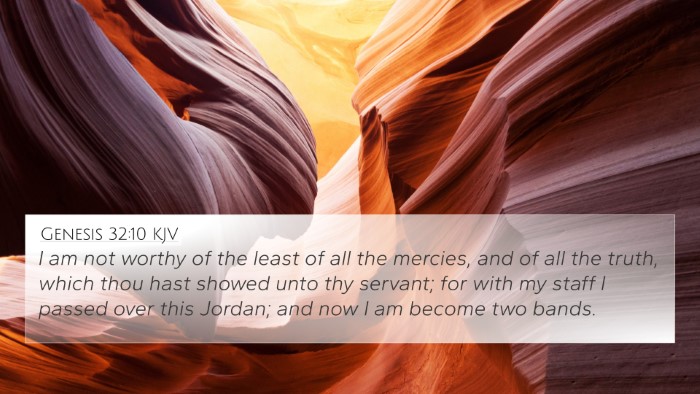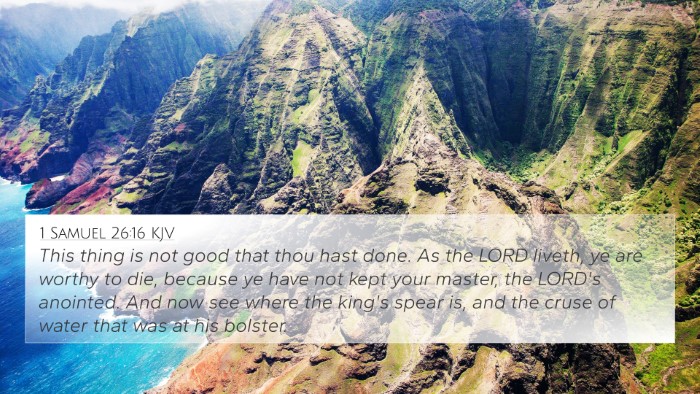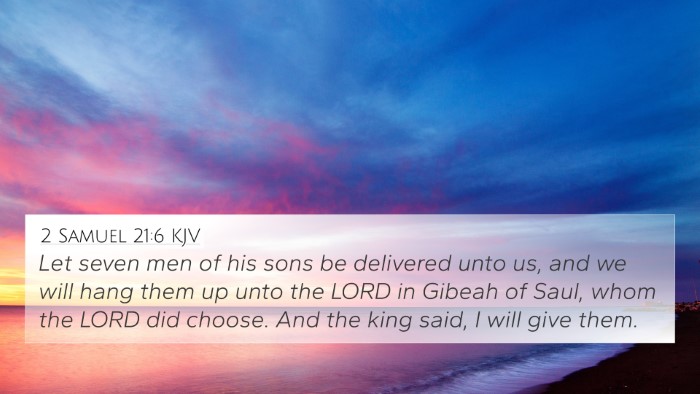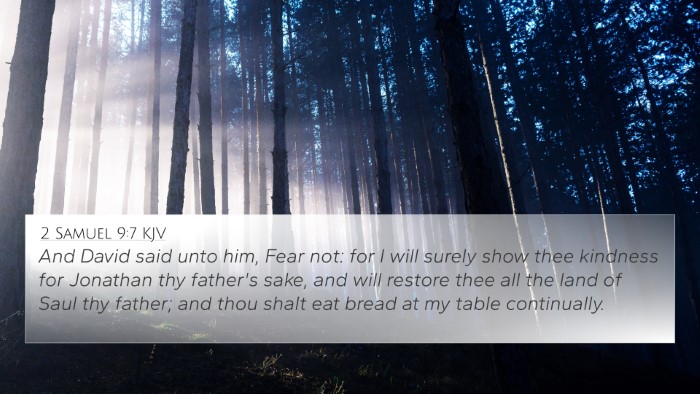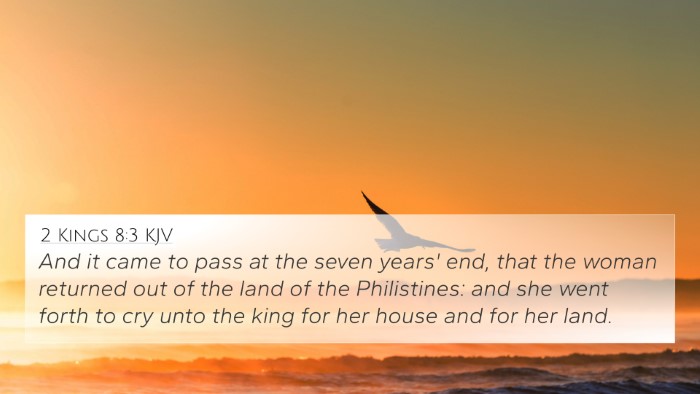Understanding 2 Samuel 19:28
Bible Verse: 2 Samuel 19:28
This verse states, “For all of my father's house were but dead men before my lord; yet didst thou set thy servant among them that did eat at thine own table. What right therefore have I yet to cry any more unto the king?” This evokes deep emotions and reflects the notion of grace and mercy among the relationships of David, Mephibosheth, and the larger kingdom of Israel.
Context and Themes
In this passage, Mephibosheth, the son of Jonathan and the grandson of King Saul, expresses his gratitude towards King David. David has shown kindness in sparing Mephibosheth’s life, despite the fact that there may have been political reasons to eliminate Saul's descendants. This speaks volumes about themes such as redemption, loyalty, and the complexities of royal lineage.
Commentary Insights
Matthew Henry's Commentary
Henry emphasizes David's exceptional benevolence towards Mephibosheth, highlighting that Mephibosheth felt unworthy due to his lineage and past. His expression of humility underscores the grace extended by David, a precursor to the greater grace seen in the New Testament.
Albert Barnes' Notes
Barnes points out the significance of Mephibosheth’s statement about being “dead men” before David’s kindness shows that the threats to his life were considerable given the political turmoil. He uses this moment to highlight the safety and sustenance provided through David’s compassion.
Adam Clarke's Commentary
Clarke elaborates on the socio-political scenarios governing David’s actions, reflecting on the covenant made between David and Jonathan. Mephibosheth’s restoration is seen as fulfillment of that promise, linking themes of loyalty and divine justice.
Bible Cross-References
- 2 Samuel 4:4 - Mephibosheth's injury and his vulnerable position.
- 2 Samuel 9:1 - David seeking out a descendant of Saul to show kindness.
- 1 Samuel 20:14-15 - Jonathan's covenant with David promising kindness to his descendants.
- 1 Corinthians 1:27-29 - God choosing the weak and foolish to confound the wise, paralleling Mephibosheth's lowly state.
- Romans 5:8 - Christ's grace towards undeserving sinners, echoing the grace shown to Mephibosheth.
- Luke 14:13-14 - Invitation to the poor, the crippled, the lame, and the blind, reflecting the openness of God's kingdom.
- John 15:15 - Jesus calling His disciples friends mirrors David's treatment of Mephibosheth.
- James 2:5 - God choosing the poor in the world to be rich in faith, relating to Mephibosheth's situation.
- Psalms 23:5 - God preparing a table for His people relates to David's act of kindness to Mephibosheth.
- Ephesians 2:5 - While we were dead in our transgressions, God made us alive in Christ, akin to Mephibosheth's ordeal.
Thematic Connections
This story can be linked to the broader biblical theme of God’s redemptive work in unlikely scenarios. The connections between this Old Testament narrative and that of Jesus’ teachings highlight the continuation of God’s grace throughout scripture.
Conclusion
2 Samuel 19:28 not only serves as a testament to the grace of King David, but it also foreshadows the ultimate acts of grace exhibited in Christ. This passage encourages believers to reflect on their own lives and the grace they have received from God and how they, in turn, can extend grace to others.
Resources for Further Study
- Bible concordance for identifying cross-references.
- Bible cross-reference guide for exploring interconnected scriptures.
- Cross-reference Bible study techniques for deeper understanding of themes.

